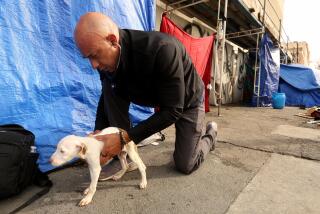Respiratory Ailments Are Common in Cats
- Share via
Q: I am concerned about my 4-year-old Siamese cat who has recently started to wheeze and occasionally sneeze. She doesn’t have a runny nose or runny eyes and has a great appetite. She will walk around the house and just act like she has a very bad chest cold. At first, I thought she was purring differently but now it occurs more frequently. Could she be having a cold? Why would she seem sick sometimes and act healthy the rest of the time?
Elaine Zamora, Santa Ana
A: Respiratory ailments are very common in cats and can have a variety of causes. Most are caused by viruses and develop into signs similar to our colds: runny eyes and nose, coughing, fever, and occasional lack of appetite. Cats are also prone to develop allergic bronchial disease which could be due to antigens picked up from grooming or even fighting with other cats. Severe chest diseases such as pneumonia and pleural effusion can occur and are very serious. Tumors and fungal infections do occur and may cause congested-like signs in cats. You should definitely have your cat examined by your veterinarian. An X-ray will be necessary to look for the condition of the lungs, major airways and heart. It may be necessary to get a blood sample to determine if an infection is occurring. Your cat should also be current on vaccinations. Appropriate medication will be started and may need to be continued for several weeks. In some cases, a recheck X-ray may be necessary to follow progress. Your cat may be only having a mild allergic bronchitis but it is important to have her checked out.
Q: I have three parakeets which are all kept in the same cage. One of the females has developed some diarrhea but still seems to act normally. They are not exposed to any chemical cleaners and I make sure that their food is as fresh and clean as possible. Should I separate this one bird from the others? What kind of medication should I be giving her to stop the diarrhea? Is there anything else I should do for her?
Andrew Railsman, Orange
A: Diarrhea in very small birds can become serious if left untreated. It can be caused by anything from parasites to digestive problems and can be difficult to treat. With birds, diarrhea must be distinguished from urinary disease which also may cause fluid droppings that will appear to be diarrhea. I recommend that you have your bird checked by your veterinarian. Bring several samples of the droppings and a sample of the food that you use. It may be wise to separate the birds until you get a diagnosis. Lab tests such as fecal samples and blood tests may be necessary to help with the diagnosis and treatment of your bird.
More to Read
Sign up for Essential California
The most important California stories and recommendations in your inbox every morning.
You may occasionally receive promotional content from the Los Angeles Times.












